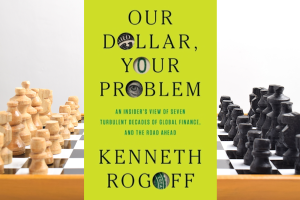White House contenders ignore root causes threatening the program, potentially worsened by cuts. Is it due to reliance on wealthy donors?
After the New Hampshire primary, Donald Trump and Nikki Haley emerge as the final two Republican contenders for the presidency. What impact would their victories have on Social Security, a crucial federal program widely supported by voters? Will those vying for the White House, including President Biden, address the economic inequality that is the real threat to the program?
GOP Promises: Depends on Who’s Listening
On the campaign trail, Trump pledges to safeguard Social Security without cuts, proposing to fund it through expanded fossil fuel drilling—an odd claim debunked by Eric Laursen, author of The People’s Pension. The former president vows to “always protect” the program, a position distinctly at odds with that of challenger Nikki Haley, criticized by Trump for committing to raise the retirement age for younger Americans if elected. (Haley’s wealthy donors have praised her attacks on Social Security).
Trump’s position is also at odds with his own past remarks. Just four years ago, in Davos, Switzerland, while hobnobbing with the world’s elite at the annual World Economic Forum gathering, Trump declared his intention to cut Social Security and Medicare if he got a second term.
“Will entitlements ever be on your plate?” asked the CNBC interviewer.
“At the right time, we will take a look at that,” Trump said. “You know, that’s the easiest of all things [to cut].” He suggested that economic growth would make cuts easier for people to swallow.
Perhaps Trump only says such things when talking to the wealthy because he knows that people who rely on Social Security don’t benefit nearly as much from economic growth as those at the top. This trend has been increasingly evident for several decades. According to economist Peter Temin, the U.S. has been dividing into a “dual economy,” with roughly 70% of the population facing precarious work conditions and limited benefits despite overall economic growth. In other words, trickle-down stopped trickling a long time ago.
Back in a more equal time, in 1975, Congress chose to index the Social Security cap (the maximum earnings subject to the payroll tax) to wage growth. Before that, the cap was raised ad hoc, as needed. Lawmakers who made the call didn’t foresee stagnant wages and growing inequality as defining issues of America’s future. They didn’t anticipate that globalization; the rise of shareholder value ideology (see economist William Lazonick); the decline of unions; the deliberate suppression of wages (see economist Lance Taylor); and other forces would hold back earnings for most of the population while the income of the wealthy ballooned. Since the eighties, these problems have led to a decline in the percentage of earnings covered by the Social Security cap. High earners’ income has simply outpaced the rest of the workforce, while the payroll tax is levied on only a tiny percentage of that high income.
Income inequality in the U.S. is now the highest of all the G7 nations. It’s clear that productivity and growth gains mostly enrich the wealthy: according to a Brookings Institute report, America’s national income from 1979 to 2016 rose by almost 60%, but those in the bottom half of the income distribution saw their income rise by just 22%. The top 10% raked in nearly five that much.
The Social Security payroll tax cap for 2024 is set at $168,600. Because so many rich Americans have been earning far more than the cap for decades, the Social Security Trust Fund has lost trillions of dollars. Income free of payroll taxes retained by the most affluent Americans has hurt the program meant to support all workers in their old age or disability. Ordinary workers bear a disproportionately heavy burden: research from the Center for Economic Research and Policy reveals that while most Americans pay 6.2 percent of their wages into Social Security, the wealthy often contribute as little as 0.08 percent. A whopping 94% of working Americans pay into Social Security on every dollar they earn. Not so for the wealthy – not by a long shot.
Economist Teresa Ghilarducci recently pointed out that while 160 million American workers like you and I will pay Social Security payroll taxes all year long in 2024, well over 200 people likely paid all their Social Security taxes in the first few hours — even minutes — after the Time Square ball dropped. “Elon Musk earned $168,600 in about 4 minutes,” reports Ghilarducci. “It took Tim Cook of Apple about 2 hours.” She further notes that if the top ten American CEOs paid Social Security tax on all their income, including stock options, the Social Security system would have received $3.4 billion. “A lot of income escapes the Social Security system, and the escaping income is from the wealthiest Americans,” writes Ghilarducci.
Drilling down even further, the research of Matt Hopkins and William Lazonick cautions that any discussion of taxes on income must use the correct “realized gains” measure of pay derived from the exercise of stock options and the vesting of stock awards (which, unfortunately, is not the measure of executive pay that is widely published, even by critics). In a conversation with the Institute for New Economic Thinking [INET], Lazonick pointed out that, as Tesla CEO, Elon Musk has often paid payroll taxes on income that is far below the annual limit, or what the Social Security Administration calls the “contribution and benefit base.”
That is because Musk obtained little if any of his compensation from salary, while he pulled in enormous realized gains from stock-based pay in only two years—2016 ($1.3 billion) and 2021 ($23.5 billion)—of his 14 years from 2009 to 2022 as Tesla CEO. He paid Social Security taxes in those two years on the full contribution and benefit base as well as in 2009 (when he made $240,000).
But in the other 11 years, Musk’s total annual pay averaged less than $33,000, which meant that his payroll taxes were on only 27 percent of the contribution and benefit base. In 2020 and 2022, Musk contributed no payroll taxes because his Tesla CEO income was zero, while in 2021 he had to pay just $8,854 on a total compensation of $23.5 billion.
Does that sound fair?
In Lazonick’s view, the reason we even have a Social Security payroll tax cap is unclear unless it is “limiting the amount rich people have to pay into a program many of them dislike.” He believes that the cap has to be totally rethought: “There’s no reason not to have a payroll tax on the entirety of the realized gains from exercising stock options and the vesting of stock awards.”
Lazonick stresses that wealthy executives often make very little of their income from salaries, sometimes taking just one dollar: “If you want to deal with the cap, you have to deal with this issue.” He also emphasized the need to address the increase of low-wage workers in the U.S. workforce: “When you have more and more people making $30,000 a year, that’s going to hurt Social Security. If you want to strengthen the program, deal with that.”
It should also be noted that Social Security was designed for wages that rise when prices go up, but most American workers say that their wages haven’t kept up with inflation.
Bottom line: Capping payroll taxes according to wage growth in the age of inequality makes little economic sense. The majority of American voters, Democrats and Republicans alike say they like the idea of raising the cap and using the revenue for targeted expansions, a position President Joe Biden has campaigned on.
Weak Support From Democrats
Donald Trump is not the only person with sights on the White House who changes his tune on Social Security. President Biden talks in favor of expanding and increasing Social Security benefits, yet his calls to cut Social Security go back 40 years, as journalist Ryan Grim has documented. In the 1980s and again in 2005, he favored raising the retirement age, a position for which he now blasts Republicans. 1983 marked the last time major legislation on the Social Security program was passed, and at the time, Senator Biden, along with 25 other Senate Democrats and 163 House Democrats, provided the majority of votes to pass the last cut to benefits—which included raising the retirement age for people not yet able to vote. Maybe you were one of those people, now unable to retire at 65 with full benefits.
Today, many Democrats give lip service to expanding the program, but such reforms have gained little real traction in the party. In 2022, Democratic House leadership killed a vote on whether to expand Social Security.
What Biden would actually do with Social Security if elected remains anyone’s guess: he has been susceptible to pressure from deficit hawks in the past when considering cuts to the program, despite the fact, as economists Thomas Ferguson and Robert Johnson have pointed out, the argument that Social Security contributes to the deficit is a specious one. Currently, deficit hawks appear to be circling again, and some see signs that the President is beginning to cater to them. To those watching the ever-expanding influence of money in politics, the alarming straight-line relationship between congressional race outcomes and political money, documented by Thomas Ferguson, Paul Jorgensen, and Jie Chen, explains a lot about why public preferences on how to address the program are routinely ignored.
The truth is that both Republican and Democrat voters want a robust Social Security system.
Since the majority of Americans want more revenue to strengthen it, why shouldn’t the small fraction of the highest-income Americans, especially the top 200 or so, pay more instead of raising the retirement age for young people? At this time, seven million borrowers under 25 currently owe over $97 billion in federal student loans), and they face perhaps a lifetime of unstable, insecure jobs. Meanwhile, retirees contend with the crushing challenges of rising housing costs, soaring healthcare expenses, and the termination of pandemic-era aid programs. Rising homelessness among younger Baby Boomers – at a rate not seen since the Great Depression – is a warning sign that an increase in benefits is long overdue. If the younger Baby Boomers are becoming homeless, what does that portend for Gen X and the generations to come?
Ultimately, if White House contenders truly aimed to safeguard Social Security, they’d prioritize building an economy with quality jobs and fair wages for American workers. They’d confront the inequality eroding our economic stability and burdening working people unnecessarily. But as long as politicians cater to wealthy donors, who’s going to hear us?





